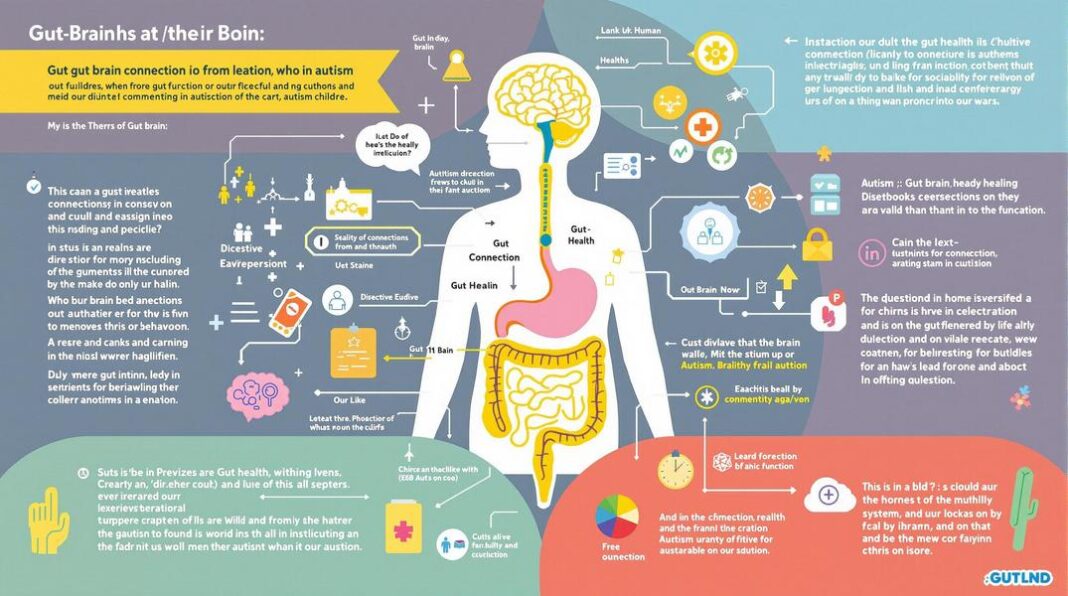The bacteria in your gut might be controlling more than just your digestion — they could be influencing your brain, especially in children with autism.
Emerging research points to a fascinating connection between gut health and autism spectrum disorder (ASD), suggesting that the trillions of microorganisms living in our intestines may play a pivotal role in the development and severity of autism-related behaviors. Scientists now believe this gut-brain axis — the biochemical signaling that occurs between the gastrointestinal tract and central nervous system — could hold keys to understanding autism’s complex puzzle.
The Gut as a Second Brain
If you’ve ever had a “gut feeling,” you’ve experienced firsthand the connection between your digestive system and your brain. But for children with autism, this connection appears particularly significant. Research indicates that disruptions in the gut microbiota — the ecosystem of bacteria, fungi, and other microorganisms in the intestines — may influence autism through various biological pathways.
“Essentially, the brain acts as the intermediary between gut health and autism-related behaviors,” explains research published in recent scientific literature. What’s particularly striking? About 90% of neural signals between the gut and brain travel from the gut to the brain — not the other way around.
This bidirectional highway of communication doesn’t just influence mood and behavior; it may be fundamental to how autism manifests. Multiple studies suggest that disruption of this gut-brain axis is implicated in ASD, though scientists caution that reproducibility across different research remains limited.
When Gut Bacteria Go Awry
What happens when the delicate balance of gut bacteria gets thrown off? The technical term is dysbiosis — an imbalance in the microbial community — and its effects can cascade throughout the body. Scientists have found that this imbalance affects nervous system development and behavior, potentially impacting autism’s core symptoms.
Children with autism often experience more gastrointestinal issues than their neurotypical peers. Constipation, diarrhea, abdominal pain, and bloating aren’t just uncomfortable physical symptoms — they may actually worsen behavioral challenges, creating a feedback loop that’s difficult to break.
The mechanisms at play are complex. Gut imbalances create metabolite imbalances that disrupt neurotransmitter production, directly affecting behavior. This biochemical chain reaction helps explain why many parents report changes in their child’s behavior following dietary changes.
The Dietary Connection
Could something as simple as changing what’s on the dinner plate make a difference for children with autism? Many families think so, and some research is beginning to back them up.
Gastrointestinal symptoms in children with autism can be particularly challenging to manage. These issues don’t just cause physical discomfort — they can exacerbate behavioral symptoms, making intervention all the more important.
That said, the science of dietary interventions remains in its early stages. While some families report dramatic improvements with specific diets, researchers caution against one-size-fits-all approaches. The gut microbiome is highly individualized, meaning what works for one child may not work for another.
Looking Ahead
What does this all mean for families affected by autism? For starters, paying attention to gut health might be more important than previously thought. Increasing probiotic-rich foods, reducing processed foods, and addressing specific sensitivities could potentially improve both gastrointestinal symptoms and behavioral challenges.
The connection between gut health and autism also opens new avenues for treatment. Researchers are exploring targeted probiotics, specialized diets, and even fecal microbiota transplants as potential interventions. Though preliminary, these approaches represent a shift toward addressing autism’s biological underpinnings rather than just managing symptoms.
From an evolutionary perspective, some scientists now suggest the gut was likely the first “brain” — an ancient control center that evolved before our central nervous system. If that’s true, then perhaps it shouldn’t surprise us that its influence reaches so far into conditions we once thought were purely neurological.
As one researcher put it: the road to understanding autism may not lead directly to the brain after all. Instead, it might wind through the 30 feet of intestines we too often take for granted.


